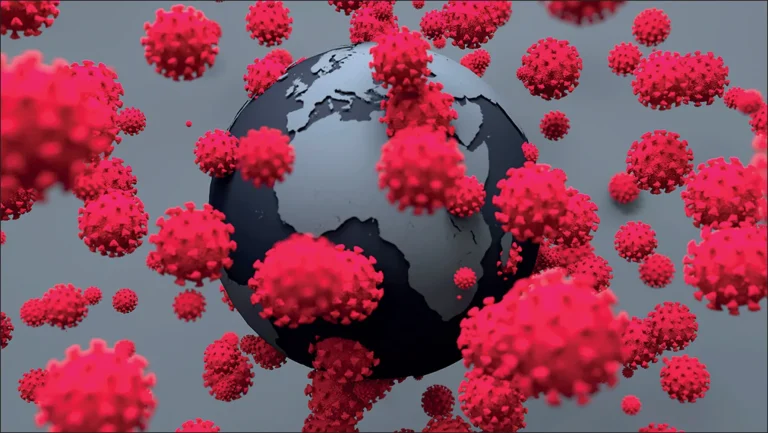A group of African scientists is urging their governments to demand a review of the role of global North-based international health organisations in shaping the new global pandemic preparedness and response treaty before its finalisation at the World Health Assembly in May. The group describes the pandemic treaty as colonialists.
The group – known as the Pan-African Epidemic and Pandemic Working Group – says international health policies should prioritise low-income countries with high disease burdens, criticising the current draft as “colonialist”.
“The lockdown regulations, which were imposed during COVID-19, and which are still being reinforced in the draft instruments, were a class-based and unscientific instrument, causing significant collateral harm to lower-income people and useless for crowded informal settings as in urban parts of Africa,” the group said in a statement.
“Lockdowns affected Africans badly because these are people who earn their living from subsistent income, and yet you lock them in for several months?”
ALSO READ Nigeria leading in heath innovations, pandemic preparedness, says Africa CDC
“It will only lead to the disruption of economies and education, entrenching future poverty and multi-generational inequality, and expanding national debt directly correlated to the debt crisis in Africa today,” the group held.
The World Health Organization (WHO) and some world leaders of rich countries in March 2021 initiated the idea of a new international treaty to prepare the world for a better response to future pandemic (s).
As a follow-up to the idea of a new international treaty, the WHO, in December 2021, established the Intergovernmental Negotiating Body (INB)—comprising all 194 member states—to negotiate, draft and debate the content of the treaty.
The WHO undertook the review of the already existing International Health Regulation (IHR) of 2005—which prescribes obligations for countries to report public health emergencies and international travel restrictions.
Over 300 amendments had been made to the International Health Regulations, with both instruments scheduled for submission in May.
But the group says the current draft of the treaty does not reflect lessons learnt from the failures of COVID-19.
Specifically, the Pan-African group is calling for a review of Article 12, new paragraph six, and new Article 13 of the newly amended International Health Regulation, which empowers the director-general of the WHO to determine “at any time” that a disease is a public health emergency of international concern, or a pandemic.
Wellington Oyibo, a medical parasitologist at the University of Lagos and the group’s health advisory director, told SciDev.Net that the impact of these measures would be akin to using a sledgehammer to kill an ant.
“Lockdowns affected Africans badly because these are people who earn their living from subsistent income, and yet you lock them in for several months?” he said.
“The people are still not over the socio-economic and educational consequences of lockdowns, because there is no government support.”
Oyibo, also the director of the Center for Transdisciplinary Research in Malaria and Neglected Tropical Diseases at the University of Lagos, said the measures taken during the COVID-19 outbreak were drastic and unrealistic for Africans.
He said the cases of COVID-19 were low in Africa, yet the global health authority insisted all of Africa should be vaccinated.
“Africa has its disease, like cholera, yellow fever, malaria and other things that kill more than COVID-19.”
The group said the phrase in the treaty that states that “state parties … undertake to follow” WHO’s recommendation threatens nations’ health sovereignty.
The scientists also say that Articles 23 and 36 of the International Health Regulations amendments, which pertain to compulsory digital passenger locator forms and mandatory certificates of vaccination, are problematic and go against the Nuremberg Code of medical ethics, which advocates for voluntary consent.
The group also said that Article 44 of the International Health Regulations, which addresses countering dissemination of information in the media and social networks, constitutes censorship and is a violation of the right to freedom of speech, adding that global bodies and rich countries aren’t the arbiters of knowledge.
Reginald Oduor, senior lecturer at the department of philosophy, University of Nairobi, Kenya, who is the social media coordinator of the group, said: “This is a perpetuation of classical western imperialism coming through the backdoor.
“It is health imperialism to subjugate knowledge from other parts of the world and think medical innovations and knowledge about COVID-19 or other pandemics have to come from Geneva or the developed countries.
“This is the reason why we must advocate for multiple centres of knowledge,” he added. “Every society has a right to have its own innovations.”
Mausi Segun, Africa director of Human Rights Watch, said she is worried that the current draft uses the word ‘encourages’ in several sentences.
“If you want countries to comply, then there must be consequences,” she said.
“At this point, it is still left to individual countries to be ‘encouraged’ whether they will adopt those policies or not. It does not take us further than where we were when COVID-19 broke out.
“The consequence is the failures we witnessed with COVID-19.”
WHO director general Tedros Gebreyesus said during his opening address at the eight meeting of the INB that the problem of trust deficit amongst the nations needs to be addressed.
“Some of the barriers affecting us from making progress is the trust deficit,” he said.
“But if we try to understand it as a common problem and solve it with flexibilities and creativity, then trust could be built. Then comes the win-win solution.”
This piece was produced by SciDev.Net’s Sub-Saharan Africa English desk.


